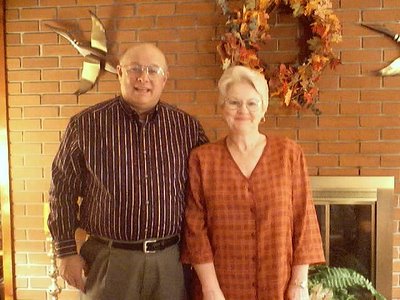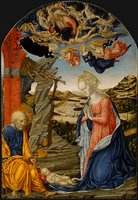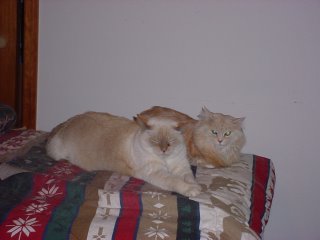Sunday 1/1/06 Year B - New Year's Day
Psalm 148
Galatians 4:4-7
Luke 2:22-40
Encountering God in Worship
1 Corinthians 11:23-26
We have been following the revised common lectionary in our worship for several years now. We will continue to do so. Usually I base my sermon remarks on the Gospel passage for the corresponding Sunday in the lectionary. This morning, however, I wish to deviate from that practice. I have taken as my text this morning, a passage from Paul’s first letter to the Corinthians. I will read from chapter 11, verses 23 to 26. Let us read that passage together this morning.
Reading of the scripture...
For I received from the Lord what I also handed on to you, that the Lord Jesus on the night when he was betrayed took a loaf of bread, and when he had given thanks, he broke it and said, "This is my body that is for you. Do this in remembrance of me." In the same way he took the cup also, after supper, saying, "This cup is the new covenant in my blood. Do this, as often as you drink it, in remembrance of me." For as often as you eat this bread and drink the cup, you proclaim the Lord's death until he comes.
 January stands at the end of one year and the beginning of a new year. It is named for the Roman God Janus. Janus is the Roman god of gates and doors, beginnings and endings, and hence represented with a double-faced head, each looking in opposite directions. He was worshipped at the beginning of the harvest time, planting, marriage, birth, and other types of beginnings, especially the beginnings of important events in a person's life. Janus also represents the transition between primitive life and civilization, between the countryside and the city, peace and war, and the growing-up of young people.
January stands at the end of one year and the beginning of a new year. It is named for the Roman God Janus. Janus is the Roman god of gates and doors, beginnings and endings, and hence represented with a double-faced head, each looking in opposite directions. He was worshipped at the beginning of the harvest time, planting, marriage, birth, and other types of beginnings, especially the beginnings of important events in a person's life. Janus also represents the transition between primitive life and civilization, between the countryside and the city, peace and war, and the growing-up of young people.It is both traditional and appropriate at the turning of the new year to look backward and forward at the same time, evaluating what we have done and planning what we will do in the year to come.
Just as people take stock of their lives over the past year and plan for their future during the coming year, it is also appropriate for churches to do the same. It is to this end that I address my remarks on this first day of January, 2006.
The main point of religion is to connect people to God. When this happens, religion has done what it is supposed to do. When a religion, a faith, a church fails to connect its membership with the God of that faith, religion, that faith community and/or church becomes irrelevant.
Often in the past year, I have wondered if Hope Memorial Baptist Church may have become irrelevant in bringing the people of this community in contact with God, the Father, Son and Holy Spirit.
We pay attention to prophets because they bear witness to encounters with God. Their words and life confirm their claims. The apostle Paul is one of those prophets whose words have power because we believe Paul really did meet Jesus face to face on the road to Damascus.
Paul had done missionary among the Corinthians, and a church was created from his efforts. Since most of the Corinthians were pagans before they joined the church, they had no idea how they were supposed to worship God. Our text was written between the years 52 and 54. This was about twenty years after the death of Jesus and about fifteen years before the writing of Mark, the first Gospel. Beliefs, and practices were passed along by word of mouth.
Children play a game where they sit in a circle and one starts by whispering a tale in the ear of the person next to them. The second does the same until the tale makes it all around the room. Then the fun of the game is see how different the tale is at the end of the cycle from what it was at the beginning.
And just as a tale changes character when it is passed around the room, stories of Jesus, his teachings and instructions for practicing the faith were being mis-stated, misunderstood and misused.
Paul begins with “For I received from the Lord what I also handed on to you...” Paul did not create this form of worship, but passed on what he had learned.
I. The Lord Took Bread... “This is my body,”
“The Lord Jesus on the night when he was betrayed took a loaf of bread, and when he had given thanks, he broke it and said, ‘This is my body that is [broken] for you.”
The bread we take in the Lord’s Supper connects us to Christ. We are doing more than remembering here. The supper is more than just a symbol. We are in company with the resurrectd Christ. We call the Lord’s Supper communion becaus in the act of worship we are in communion with the Lord. Jesus wants us to remember everything about Him – His love for us, His forgiveness, His purpose, His hope, His presence, and His power.
Some churches observe the Lord’s Supper once a month, others, both catholic and protestant, including some baptist churches, observe the supper as a part of their worship every Sunday. The call it the Eucharist. Eucharist is a Greek word meaning Thanksgiving. And it is this giving thanks to our Lord that is meant when they observe the Eucharist. This pattern of observance goes back to the earliest times. They believe that through the Lord’s Supper, Christ comes near. The point of worship, remember, is to put us in touch with God.
II. Then He took the cup... “The New Covenant,”
“In the same way he took the cup also, after supper, saying, ‘This cup is the new covenant in my blood. Do this, as often as you drink it, in remembrance of me.’”
Covenant is a key word in the Bible. God made a covenant with Noah, Abraham, Moses and the children of Israel. Covenants are between two or more parties and they spell out what is expected in the relationship between the parties that is governed by the covenant. God chose and approached the people of Israel, He would become their God, and they would obey His law.
Keeping the law turned out to be an impossible task. People couldn’t do it. The Israelites couldn’t do it. Christians, today, can’t do it. So as far back as Jeremiah in the Old Testament, God began to speak of a New Covenant. It is to this New Covenant that Jesus referrs when he says, “this is the New Covenant in my blood.”
But covenants always demand a price. To get from the Old Covenant to the New one cost Jesus his life. No longer is religion about Moses and the law; now it is about Jesus and about Grace.
III. Remembering.
Twice Jesus has called us to remember. Once after the bread and once after the cup. Samuel Johnson once said, “It is not sufficiently considered that mankind requires oftener to be reminded than informed.”
We celebrate the Lord’s Supper often because it centers us on Jesus. The supper calls us to first things. Not everything in our faith has the same importance. Jesus, the cross and his resurrection, is the very core of our faith. When we remember, we remember what is most important.
But, remember, the point of the supper is not remembering, it is communion. The point is an encounter with the risen Christ. When our worship does what it is intended to do, we have fellowship with more than just the people assembled here. We meet the God that we know in Christ.
IV. Proclaiming.
“For as often as you eat this bread and drink this cup, you proclaim the Lord’s death until he comes.”
There is more than one way to preach and more than one way to do the work of an evangelist. In the Lord’s Supper there is a subtle, implied appeal. When a sensitive soul sees the Lord Supper, that soul is drawn toward the One who gave his life in a broken body. The event pulls at the conscience. It makes us all want to come to Jesus.
Cecil Sherman lists six things that a church is supposed to do:
- Give a worship experience that connects people to God.
- Teach the Bible to laity, especially the New Testament.
- Do pastoral care that heals the wounded and creates Christian fellowship.
- Do missions, both hands-on missions and checkbook missions.
- Do the work of an evangelist.
- Maintain the institutional church;












